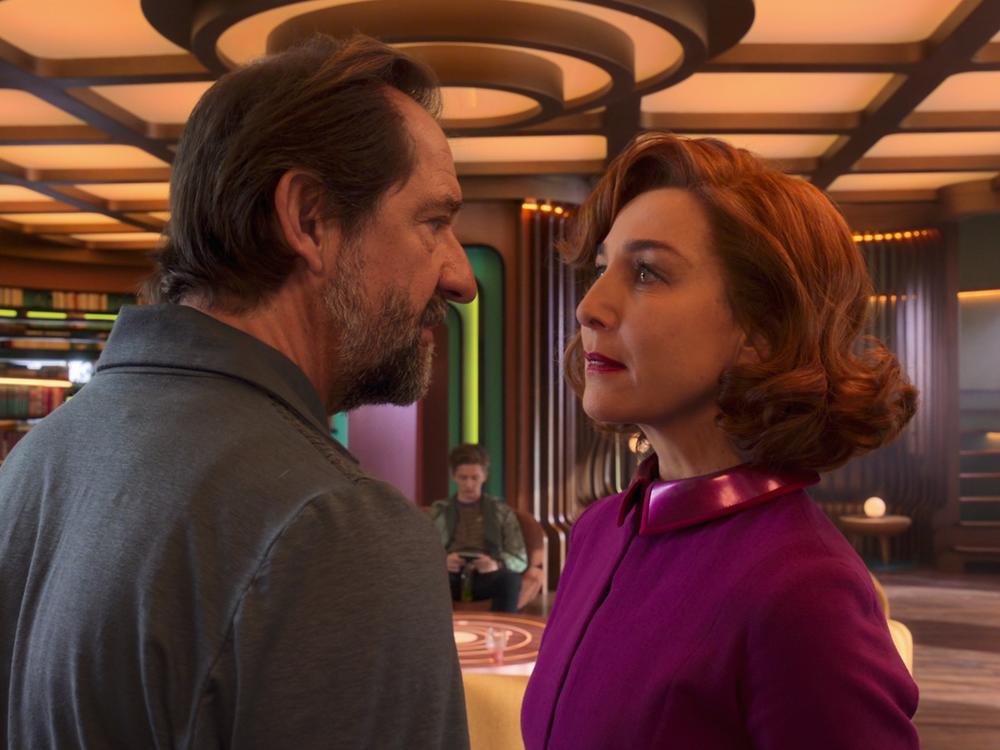Section Branding
Header Content
Visually stunning satire 'Bigbug' finds laser-targeted laughs amid a robot uprising
Primary Content
While watching Jean-Pierre Jeunet's exquisitely wrought Bigbug — a new comedy about a bunch of bickering suburbanites trapped inside a home by their domestic robots — you can't help but keep expecting it to fail.
Who could blame you? After all, the Jeunet films most familiar to U.S. filmgoers (Delicatessen, The City of Lost Children — both co-directed with Marc Caro -- and Amélie) are, while wildly imaginative and visually stunning, pretty blunt narrative instruments. Intentionally so, of course; Jeunet traffics in surreal spectacle and movie magic, and seems perfectly content to leave things like subtle interiority and emotional nuance to others.
But so what? After all, those films were hugely entertaining. So it's not Jeunet's filmography in and of itself that causes you to worry. No, it's the promised marriage of his signature, well-established, swing-for-the-fences cinematic sensibility to Bigbug's ostensible subject.
In the film's opening minutes, Jeunet and fellow screenwriter Guillaume Laurant go to work setting up a series of satirical targets so broad, so well-worn and so often and easily mocked that you're seized with a sense of dread. You can't help but gird yourself at the notion of spending the next two hours watching the film dutifully toppling them like so many hacky dominoes.
The film's set in a suburbia (check!) of the future where giant television screens float up to your bedroom window to target-advertise to you, (capitalism's bad, get it?) and humans willingly surrender their privacy and independence for the convenience of domestic robots (technology! It's the worst!). Thanks to sea-level-rise, only the very rich and pampered can afford to escape to luxurious vacations on vast floating hotels (income inequality, a.k.a. boo capitalism, redux!). Meanwhile, the latest model of androids are maybe-possibly ushering in a totalitarian state and offering it up as entertainment to humans who are too witless to notice it (reality television as fascism, or something!). Kids are constantly checking their devices (uch, the young and their SCREENS, right?), and pets are cloned (technology bad! Still! Some more!).
Even the characters we meet in these opening minutes seem broadly satirical types. Alice (Elsa Zylberstein) is a middle-aged woman longing for love. Max (Stéphane De Groodt) is a man on the make. Soon, Alice's rich ex-husband Victor (Youssef Hajdi) arrives unannounced with his new flighty, grasping girlfriend Jennifer (Claire Chust), Alice's nosy neighbor Francoise (Isabelle Nanty) follows, looking for her dog. Also in residence: a couple teenagers (Hélie Thonnat and Marysole Fertard), who sulk and rebel, respectively.
Meanwhile, on their virtual entertainment screens, eerily grinning military androids known as the Yonyx (played by François Levental) host an endless progression of programs that ruthlessly mock humans.
You see what I mean: Everything about those opening minutes augurs a breathless, frenetic, broadly satirical tone that should be impossible to maintain without wearing down an audience's patience.
But as soon as the house's domestic robot Monique (a fantastic Claude Perron) locks down the house, the broad-brush traits that initially characterize everyone in the film — vanity, lust, greed, sloth, etc. — begin to chip away. And as they argue with one another, they collectively develop a steely resolve, hatch plans to escape, and come to know and care for one another. And they're not the only ones — Monique and her fellow robots attempt to grow as well.
When the long-foreshadowed contact with the creepy Yonyx occurs, the various characters react in ways that feel both surprising and inevitable — and thus, satisfying — in a very real (but deeply, deeply weird) way.
All of this takes place in a setting that's just as boldly imaginative, visually rich and spectacular as any Jeunet has presented before — albeit one that feels more directed, more focused, more narrowly and effectively channeled. The action takes place in a recognizable suburban home, yes, but it's been nudged just a few decades into the future. Curvilinear furniture and fantastic, futuristic gadgets abound, but they're cleverly incorporated into the overall design — they feel tactile, permanent, real.
Netflix kind of sprung Bigbug upon us all. There's been very little advance information about it, and even less promotion. But it's slipping quietly onto the streamer this weekend, and doesn't deserve to sink down into the murky depths of the Netflix user interface. It's a hugely clever and engaging film that defies expectations with a sly warmth that sneaks up on you; it's smart enough to temper its satirical sensibility with a fundamental belief in humanity, whether said humanity happens to reside in flesh or metal.
Copyright 2022 NPR. To see more, visit https://www.npr.org.

